中澳合作办学项目英语自主学习模式论文
- 格式:doc
- 大小:24.00 KB
- 文档页数:4
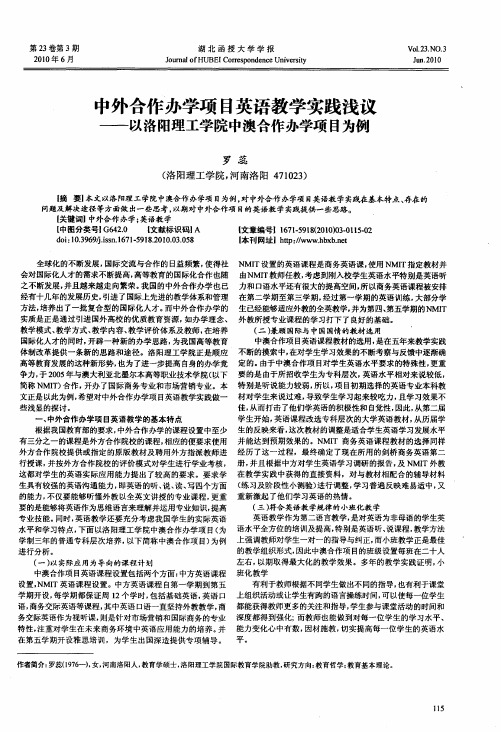
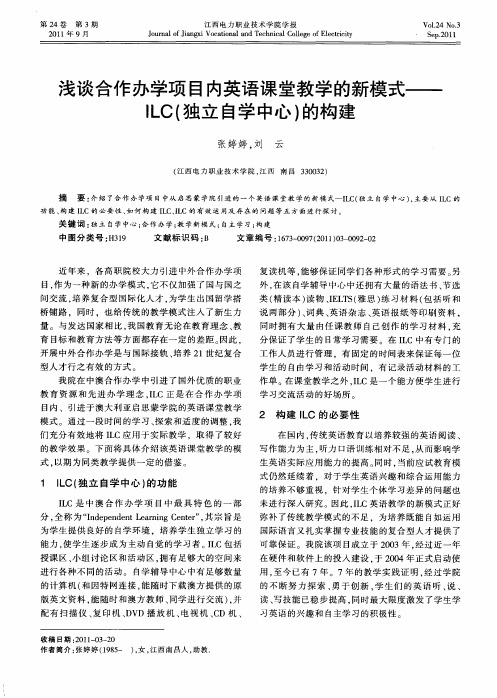
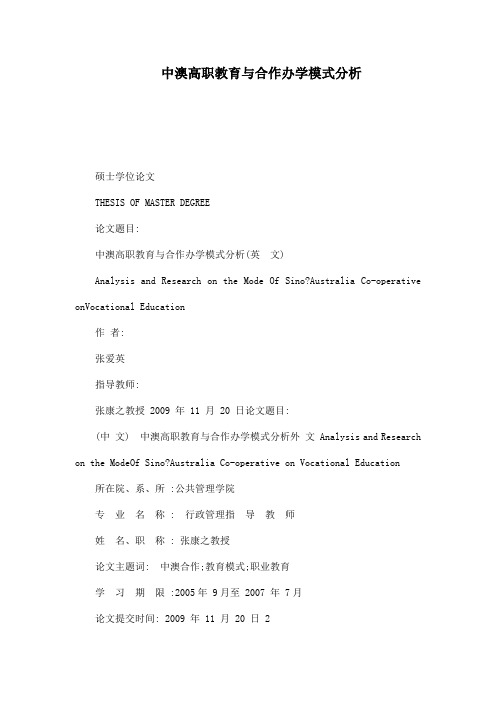
中澳高职教育与合作办学模式分析硕士学位论文THESIS OF MASTER DEGREE论文题目:中澳高职教育与合作办学模式分析(英文)Analysis and Research on the Mode Of Sino?Australia Co-operative onVocational Education作者:张爱英指导教师:张康之教授 2009 年 11 月 20 日论文题目:(中文) 中澳高职教育与合作办学模式分析外文 Analysis and Research on the ModeOf Sino?Australia Co-operative on Vocational Education 所在院、系、所 :公共管理学院专业名称 : 行政管理指导教师姓名、职称 : 张康之教授论文主题词: 中澳合作;教育模式;职业教育学习期限 :2005年 9月至 2007 年 7月论文提交时间: 2009 年 11 月 20 日 2独创性声明本人郑重声明:所呈交的论文是我个人在导师指导下进行的研究工作及取得的研究成果。
尽我所知,除了文中特别加以标注和致谢的地方外,论文中不包含其他人已经发表或撰写的研究成果,也不包含为获得中国人民大学或其他教育机构的学位或证书所使用过的材料。
与我一同工作的同志对本研究所做的任何贡献已在论文中作了明确地说明并表示了谢意。
签名: 张爱英日期:2009年 11月20日关于论文使用授权的说明本人完全了解中国人民大学有关保留、使用学位论文的规定,即:学校有权保留送交论文的复印件,允许论文被查阅和借阅;学校可以公布论文的全部或部分内容,可以采用影印、缩印或其他复制手段保存论文。
签名:张爱英导师签名: 张康之日期:2009年 11月 20日3摘要高等职业教育国际化成为实施高等职业教育过程中的重要组成部分,中外合作办学的人才培养模式成为我国高等职业教育国际化最常见的形式之一。
文章通过中澳职业与教育合作办学模式阐述了教学计划适应行业、企业和市场的需要,“产学结合、校企合作”创新办学模式,打造“双师型”教师队伍的具体做法及启示。
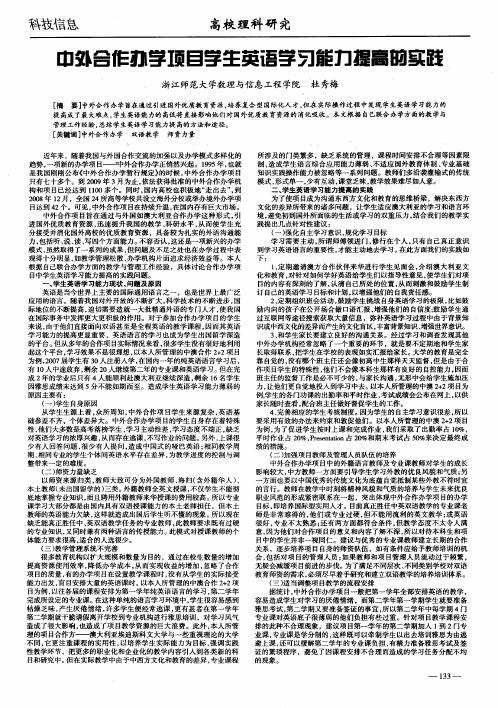

2000论文题目 A Brief Analysis on Autonomous Learning in (英文)English Study论文题目简析英语学习中的自主学习(中文)目录Abstract (ii)摘要.......... .......................................................................................................................... i i Outline .................................................................................................................................. i ii 提纲. .................................................................................................................................... .iv 1. Introduction .. (1)1.1 Definition of learner autonomy (1)1.2 The importance of developing learner autonomy in English self-study (2)2. The factors influenced learner autonomy..................................................... (3)2.1 Motivation (3)2.2 Attitude (4)2.3 Learning strategy (5)2.4 Cognitive style (5)3.The roles in learner autonomy in EFL (6)3.1 Roles of autonomous learners (6)3.2 Teachers’ roles (6)3.3 Roles of materials (7)3.4 Roles of institutions (7)4.Conclusion (8)Works Cited (9)A Brief Analysis on Autonomous Learning in EnglishStudyWang PingAbstract: W ith China entering into WTO, the development of China’s economy and opening policy brings new challenges to English learning. English has become more and more prevailing .So more and more people will pay attention to English learning. The paper mainly focuses on a brief analysis of self-study in English learning, so as to find out the factors influenced learner in self-study and the roles in learner autonomyin EFL.Key words: English learning; autonomous; factors; roles简析英语学习中的自主学习汪萍摘要:随着中国加入WTO,中国经济的发展和对外开放政策给英语学习者带来了新的挑战,当今世界英语变得越来越盛行。
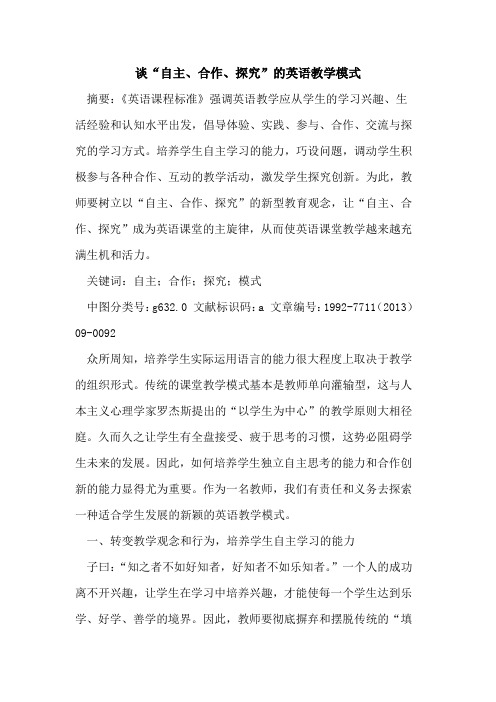
谈“自主、合作、探究”的英语教学模式摘要:《英语课程标准》强调英语教学应从学生的学习兴趣、生活经验和认知水平出发,倡导体验、实践、参与、合作、交流与探究的学习方式。
培养学生自主学习的能力,巧设问题,调动学生积极参与各种合作、互动的教学活动,激发学生探究创新。
为此,教师要树立以“自主、合作、探究”的新型教育观念,让“自主、合作、探究”成为英语课堂的主旋律,从而使英语课堂教学越来越充满生机和活力。
关键词:自主;合作;探究;模式中图分类号:g632.0 文献标识码:a 文章编号:1992-7711(2013)09-0092众所周知,培养学生实际运用语言的能力很大程度上取决于教学的组织形式。
传统的课堂教学模式基本是教师单向灌输型,这与人本主义心理学家罗杰斯提出的“以学生为中心”的教学原则大相径庭。
久而久之让学生有全盘接受、疲于思考的习惯,这势必阻碍学生未来的发展。
因此,如何培养学生独立自主思考的能力和合作创新的能力显得尤为重要。
作为一名教师,我们有责任和义务去探索一种适合学生发展的新颖的英语教学模式。
一、转变教学观念和行为,培养学生自主学习的能力子曰:“知之者不如好知者,好知者不如乐知者。
”一个人的成功离不开兴趣,让学生在学习中培养兴趣,才能使每一个学生达到乐学、好学、善学的境界。
因此,教师要彻底摒弃和摆脱传统的“填鸭式”教学,把主要精力放在为学生创设学习情境、提供信息、引导学生积极思维上,提高学生的课堂参与度,让学生真正成为课堂的主人。
所谓培养学生自主学习能力,就是让学生在教师的引导下独立地进行学习。
在学习过程中,独立发现问题,师生共同解决问题,逐步形成自我学习的能力。
“学会学习”相对于传统教育观念是一个重大转变,已成为学校改革的一项重要课题。
引导学生自主学习的方法很多,从当前学生的实际情况来看,在引导上应特别强调以下几点:一是创设问题情境,引起学生为解决问题而积极思考。
自主学习特别强调问题在学习活动中的重要性。
中外合作办学中英语教学的优化山东科技大学济南校区公共课部外语教研室庞常青入世以后 ,境外高校纷纷抢滩中国教育市场 ,高校中外合作办学正在如火如荼地进行。
它作为一种新的办学模式,可以强强联手 ,培养复合型国际化人才 !与世界上教育先进国家相比,我国的高等教育在教育理念、教育方法和专业设置方面都存在一定的差距。
在高等教育领域开展中外合作办学是缩短这一差距、与国际接轨、培养 21 世纪国际化人才的有效方式。
其中重要任务应该是借鉴国外教学特色和经验,使我国教育能迅速发展壮大。
根据教育部统计,中外合作办学项目中工商管理类专业占36%;电气信息类占13%;经济类占10%;其他专业占22%;纯语言类只有19%。
可见,大多数中外合作办学项目都有自己的专业方向。
由于这些专业大多使用双语教学,因此,外语教学的地位和方向就要首先进行合理科学地定位。
我们山东科技大学济南校区 2007 年开始承担中澳、中美合作办学的任务。
作为英语教师,我们深感责任重大,这是新的机遇,也是新的挑战。
在没有前车之辙可以借鉴的情况下,我们开动脑筋,深入学习,形成自己对合作办学中英语教学的新认识。
一充分认识中外合作办学英语教学的重要性中外合作办学班的学生教育应该不外乎 3 大目标:语言目标、专业知识目标以及英语思维能力目标,最终培养既精通英语,又有自己专业化特长的国际性人才。
从语言目标来讲:无语言障碍是21 世纪人才条件之一,而英语成为世界共通语是不争的事实。
合作班的学生的优势应该首先是语言优势。
如何使学生能掌握英语这门第二语言,使其成为特长,这是我们教师的责任。
从英语思维能力目标来讲:因为汉语与英语分属两种不同的语系 ,二者之间不存在一一对应的关系 ,两者思维方式不尽相同。
对于那些原来用英语表述的信息 ,只有同英语思维者一样思考,将信息放置在特定英语背景下 ,根据他们的思维方式进行学习、思考 ,才能收到最好的效果。
目前 ,中国学生存在的较为普遍的问题是语言运用能力差,最大的障碍就是听力和口语表达能力差。
英语专业课堂学生自主合作学习论文摘要:“授人以鱼,只供一饭之需;授人以渔,终身受用不尽。
”学生只有掌握开启学习和创造之门的钥匙,才能可持续发展的潜力,才能真正自由地进入学习和创造的殿堂。
而同时自主合作学习是发展学生学生自主性、能动性和创造性的有效学习模式,体现了“以学生为中心”的教育理念,符合时代对培养人才的要求。
二者相互依存,相互促进,不可分离。
自主与合作学习是现代教育教学中所倡导的学习与教学方法,它充分体现了“学习应当成为学习者主动和由学习者推动的过程”这一理念,也符合教育以学生为中心的要求。
自主合作的学习方式为学生提供了大量使用目的语进行交际的机会,交际内容更贴近学生的现实生活。
师生、学生和学生之间的交互活动是多边进行的,学生能充分利用自己的创造性思维独立自主思考,主动探究问题,形成相同问题的不同答案,学习环境更为宽松,提高了学习兴趣,能使他们在参与学习的活动中得到愉悦的情感体验。
在英语课堂上,学生在相互间的交流中把课文中的英语信息通过转换运用到口头表达中,这样可以掌握口语技巧,提高英语听说读写能力,促进英语语言综合能力的提高和创新思维能力的培养。
自主合作的学习方式强调由学生自己来构筑知识、发现知识和扩展知识。
这种模式能使学生在学习上收获更大,创造能力更强,不同层次的学生都能从中获取知识,进而最大面积地提高学生英语整体水平。
英语自主合作学习现状中存在的问题在过程中仍存在不少问题,主要总结为以下几点:1.学生的主动性不高,大部分学生不积极参加竞赛:同学们英语能力有所欠缺,小组合作型学习强调的是积极的相互依赖关系,而大部分同学却误解了合作性学习带来的优势,合作性学习任务是通过小组成员的分工与协作来完成。
2.对于各自完成的任务,学生鉴于自身能力的不杰出而不敢对其他同学所完成的任务予以评价。
3.完成任务后,学生不认真反复总结反思,仅仅是应付形式而已。
4.学生学习无主次之分,没有在学习过程中找到适合于自身的学习方法。
中澳合作办学中TAFE英语教学方法改革与创新发表时间:2015-01-30T09:08:01.417Z 来源:《教育学文摘》2014年12月总第141期供稿作者:秦娟[导读] 我校在同澳方合作办学引进TAFE课程体系的同时,也引进了TAFE的教育模式、教学方法。
秦娟上海食品科技学校201500摘要:TAFE英语教学质量直接影响中澳合作办学项目学生的培养质量。
为提高TAFE英语教学质量,保证合作办学顺利进行,我校对引进的TAFE英语课程体系进行了改革创新。
在教学方法的改革中,基于能力本位的培养目标,确立了情境教学法、任务教学法、学习策略教学法等,力求使学生既能够更好地掌握学科基础知识,又能够提高综合素质和能力。
关键词:TAFE英语课程教学质量教学方法自主学习TAFE教育模式被视为目前国际上最成功的职业教育模式之一。
自上世纪70年代成立以来,它一直遵循“以能力为核心,以就业为导向”的人才培养理念,并把学历教育和职业技能培训、资格认证结合起来,培养目标直接针对职业岗位的需求。
经过几十年的发展,逐步形成了适应全球化经济发展和技术进步要求的、特色鲜明的人才培养模式。
但TAFE课程在我校中职食品专业合作办学中被移植过来后,并未能得到贯彻实施。
TAFE英语教学质量不高,成为合作办学能否顺利进行以及保证人才培养质量的瓶颈。
为了打破这一瓶颈,保证TAFE英语的教学质量,提高合作项目学生的英语水平,合作办学双方的管理者和TAFE英语的任教老师对我校的TAFE英语教学进行了探索和研究。
研究涉及方方面面,如,合作办学项目生源质量问题、中澳双方教育文化差异、教学方法改革、考核评价制度确立、师资队伍建设及课程资源建设与开发等,涵盖整个TAFE英语课程体系。
教学方法和教学资源开发是澳大利亚职业教育的两大亮点,也是澳洲职业教育系统性、科学性的具体体现。
本文主要对本次研究中教学方法的改革与创新进行阐述。
一、教学实践中的矛盾我校在同澳方合作办学引进TAFE课程体系的同时,也引进了TAFE的教育模式、教学方法。
中外合作办学项目下高职院校学生英语自主性学习能力研究Introduction:In recent years, the increasing number of Sino-foreign cooperative education programs has brought about a significant change in China's higher education. These programs aim to provide students with international academic experience and a global perspective. As a result, students are expected to acquire a high level of competency in English, which is the language of instruction. To ensure this, many colleges and universities have incorporated special measures like extracurricular activities, self-study programs, and language labs, among other things. This paper aims to investigate the impact of self-study on the English proficiency of students enrolled in a Sino-foreign cooperative education program.Purpose:The purpose of this study is to examine the factors that affect English learning among students in a Sino-foreign cooperative education program. In particular, it aims to evaluate the self-study programs provided in these programs and assess their effectiveness in improving students’ proficiency in English.Methodology:The study is conducted using a mixed-method approach. Data was collected from both primary and secondary sources. A survey was conducted among students enrolled in a Sino-foreign cooperative education program, seeking their opinions on the program and its effectiveness. The survey was conducted using a questionnaireconsisting of both open-ended and close-ended questions. Closed-ended questions were used to obtain demographic information, while open-ended questions required students to give detailed insights into their experiences.Additionally, data was also collected through secondary sources. Several articles, books, and journals provided insights on the methods used to teach English as a second language and factors that contribute to students' success in learning a new language.Results:The results indicated that, overall, students felt the self-study programs provided in the Sino-foreign cooperative education program were effective. The students were found to be motivated to learn English and believed that the self-study programs helped them achieve their goals. However, the students faced some difficulties in terms of time management, interruptions from social media, and other distractions. These issues affected the efficiency of their self-study programs to a certain degree.Furthermore, the study revealed that the success of self-study programs strongly depended on the students' individual learning strategies. Some students were found to be more successful than others in terms of learning speed and progress. The study identified that the most successful students were those who eagerly pursued their studies, maintained a disciplined approach to their studies, had a clear understanding of their goals, and were self-motivated. These students were more likely to avail of the self-study programs offered and made the most of them.Conclusion:Based on the results, this study recommends that Sino-foreign cooperative education programs must focus on providing students with an environment that promotes self-study programs and encourages students to take full advantage of them. Facilitating an environment that helps students set achievable goals, build self-discipline, and learn effective time management techniques is crucial. Providing students with guidance and support systems to overcome distractions like social media and other modern technologies will enhance the effectiveness of self-study programs. Finally, implementing personalized learning strategies could make the programs more effective because different individuals have unique learning styles, and identifying these would help students maximize their learning potential.Recommendations:Based on the findings of this study, several recommendations could be made to improve the English proficiency of students in Sino-foreign cooperative education programs:1. Provide a conducive learning environment:The success of self-study programs strongly depends on the student's environment. Therefore, creating a conducive learning environment is essential. Educational institutions need to ensure that they provide students with the necessary facilities and infrastructure to support their studies, such as well-equipped libraries, language labs, and computer rooms. Additionally, institutions must create a learning community that offers peersupport, study groups, and academic counseling.2. Encourage self-motivation:Motivation is a crucial factor in learning a new language. Sino-foreign cooperative education programs should create a culture that encourages and supports students' self-motivation. To achieve this, institutions must establish conducive learning environments, support students' unique learning styles, and provide ongoing feedback and support.3. Set achievable goals:To maintain a student's motivation, it is essential to set achievable goals. Sino-foreign cooperative education programs must provide students with clear goals that are achievable. Institutions should encourage students to set their goals and support them throughout the learning process.4. Build self-discipline:Self-discipline is a vital trait to maintain motivation while studying. Sino-foreign cooperative education programs must encourage the development of self-discipline skills in students. To achieve this, institutions could offer study skill classes that aim to teach students time management, organization, and self-discipline.5. Personalized Learning:Students have unique learning styles, and their approaches tolearning can vary. Therefore, Sino-foreign cooperative education programs must provide personalized learning. Institutions should use diagnostic tools to identify each student's learning styles and equip them with the necessary learning materials that suit their individual needs.6. Monitor students' progress:Sino-foreign cooperative education programs must monitor students' progress continually. Institutions should provide students with ongoing feedback and support that aims to assist them in achieving their academic goals. Additionally, regular assessments should be conducted to measure students' progress in terms of their English proficiency.7. Address social media Interruptions:Finally, social media and other modern technologies can significantly impact students' progress. Instituting mechanisms to address these distractions would help improve the effectiveness of self-study programs. Institutions could incorporate learning apps that limit social media usage during study hours, create a designated study area, and offer awareness training.Conclusion:In conclusion, self-study programs play a significant role in enhancing the English proficiency of students in Sino-foreign cooperative education programs. This study indicated that students who actively utilized these programs had higher languageproficiency levels than those who did not. To ensure the success of self-study programs, it is essential that educational institutions provide students with a conducive learning environment that encourages self-motivation, sets achievable goals, and builds self-discipline. Additionally, personalized learning strategies must be implemented to cater to every student's unique learning styles and abilities. Regular monitoring of students' progress must be conducted to provide ongoing feedback and support, and mechanisms must be put in place to address modern distractions like social media. Finally, the recommendations proposed in this study have the potential to enhance the effectiveness of self-study programs and promote the overall success of Sino-foreign cooperative education programs.As an AI language model, I do not have any emotions or insights. However, I hope that the recommendations mentioned above can help improve the English proficiency of students in Sino-foreign cooperative education programs.。
中澳合作办学项目英语自主学习模式探讨
【摘要】本文阐述了江西电力职业技术学院与澳大利亚启思蒙学院合作办学的新英语自主教学模式——ilc。
文章从ilc的硬件配置、课堂教学实施、课堂教学效果和特色几个方面进行阐述。
【关键词】ilc课堂英语自主学习合作办学
随着我国经济、教育改革的深化,高等职业教育人才培养面临许多新的挑战。
当前高等职业教育的主要目标是培养具有一定理论知识和较强的实践能力,实用型、技能型人才。
而传统大学英语教学以培养较强的英语阅读能力为主,听力口语训练相对不足,影响了学生英语口语交际运用能力的提高。
而且高职院校存在对学生英语学习兴趣和素质培养重视不够,忽略个体差异的现状。
ilc英语教学新模式恰好弥补了传统教学的不足,为能力型、实用型、技能型人才培养提供了可靠的保证。
ilc(independent learning center)是江西电力职业技术学院和澳大利亚启思蒙学院合作办学项目的新模式,其目的是给学生开辟一个独立学习和语言训练的场所。
该项目经学校不断培育、创新,学生们听说读写技能得到了很大提高,对英语学习有了浓厚兴趣,受到了项目合作方的肯定以及院校同仁的认可。
一、ilc教学模式的硬件配置
ilc教学模式的硬件配备主要有三大部分:其中有25台供学生上网使用的计算机,1台供观看各类英语影视作品的视听设备,10个供听力训练的语言复读机。
另外还有供阅读和写作用的各类英语书
籍、杂志、报刊等。
这三部分的硬件基本满足了学生在ilc进行的语言技能训练和交流活动。
ilc共划分出五个活动区域,分别是听力训练区、口语训练区、阅读写作区、视听训练区和网络资源区。
1.听力训练区:配备10个语言复读机,供学生进行听力训练。
听力内容分别有初级、中级、高级等不同水平。
学生根据听力水平自主选择不同内容,真正做到因人施教。
2.口语训练区:口语训练区里为学生提供了便于交谈的小隔间,里面摆放有桌椅。
学生在这里按照老师指定的口语题目进行训练或自由式口语对话。
可以是学生相互谈、师生对谈等形式。
3.阅读写作区:这一部分内容和分量较大有近百余册的英语各类书籍涵盖了几乎国外所有著名的文学读物。
所有的英语阅读以不同的用途分为听说读写、语法、写作、雅思等类别。
4.视听训练区:是学生们最喜欢的活动区域,在这里学生们可以看到他们所喜爱的电影故事、电视剧和国家地理等光碟。
5.网络资源区:ilc教室里的25台计算机供学生查找资料和浏览信息。
教师在课前根据不同的学习内容和水平为学生准备相关学习英文的网站或者内容。
课结束前学生要写出上网活动内容和体会。
二、ilc教学模式课堂实施
课堂教学有别于传统课堂教学。
此教学模式中用于教师讲评和统一的教学活动只占或少于三分之一的时间,教师通常当堂发给学生的补充材料而非教科书内容。
学生普遍乐于接受这种灵活新颖的教学形式。
在课堂上真正唱主角的是学生,来到这里忙于完成他们要
准备的各项任务。
课堂上中方英语教师的主要职责是提供教学服务,如解答提问、提供资料、个别辅导等个性化服务,起引导和帮衬的作用。
此外为丰富ilc课堂活动和内容,ilc课堂要求教师根据学生水平制作各种类型的课件,分为听力、阅读、词汇、对话等不同水平的内容。
课件不同于课本之处在于内容新,有时效性。
随时将国内外发生的大事编进课件中供学生活动使用。
ilc课堂另一个特点是具有变通性,学生可根据自己的程度和兴趣,选择不同水平和题目的课件展开活动。
课结束时,教师看到的是各种充满个性的答案,也调动了同学们自主学习的积极性。
三、ilc教学模式教学特色与课堂效果
ilc课堂给学生以充分的空间和自由活动时间,因此ilc课堂管理的好坏是要达到预期效果的关键。
课堂管理突出体现在课前、课中和课后整个的学习过程。
教室备有每个学生的档案。
里面有他们历次活动的记录。
每位学生都要有课前签到记录,课后要在自己的文件夹上记录自己的活动内容和评论。
每次上课结束之前,学生都要在不同记录表上填写自己的活动内容、评论和意见。
教师可根据学生的评论和建议及时调整和添加内容。
在上网记录表和视听训练表上,学生还要用英语详细填写浏览和观看的主要内容或观后感。
督促学生养成看英语、用英语、记英语的良好习惯,这些记录也可作为学生今后撰写文章时的参考资料。
除学生个人记录表格外,还有一个供全班同学填写的总课堂记录表,便于教师宏观地了解学生
的整体课堂表现。
学生每一次课堂表现均有教师认可的亲笔签名。
这些表格客观上起到了跟踪、监控和督促的作用。
除此之外课堂监控主要体现教师本人加强巡视、监督和引导上。
ilc课堂是一个为学生提供独立训练英语的教学环境,是英语课堂教学的延伸和加强,是一个供学生独立学习和训练英语的“实训室”。
学生根据自己的英语水平和学习需求自主选择学习内容和方式,以实现提高英语语言技能的目的,在学习中突出“自主独立”。
因而,学生具有很强的自主参与意识。
在学生ilc环境中,学生是主角是主体,教师是主导,指导不同层次的学生选择适合自己的学习内容和方式,教师担当的是提供推荐和服务的角色。
学生独立自学中心教学设施完备,保证了“以学生为本,以独立自学为主”的教育理念的贯彻和实施。
学生独立自学中心的另一个特色是注重学习过程的跟踪与监管。
参考文献:
[1]brown, h.d. 1987.principles of language learningand teaching[m]. englewood cliffs, jc: prenticehall.
[2]candy, p. 1991.self_direction for lifelong learning[m]. california: jossey_bass.。